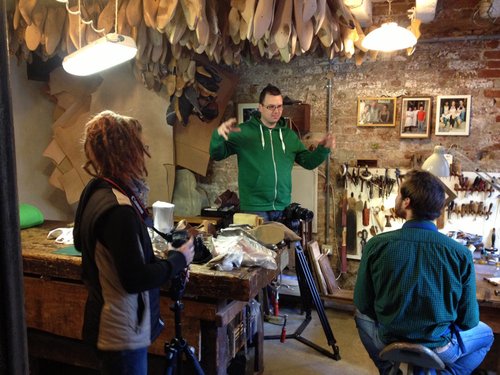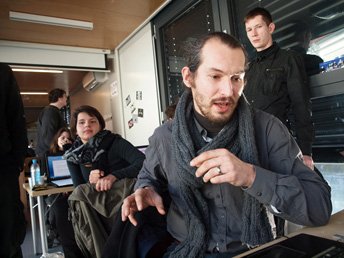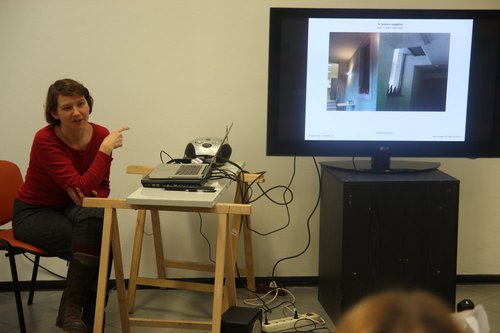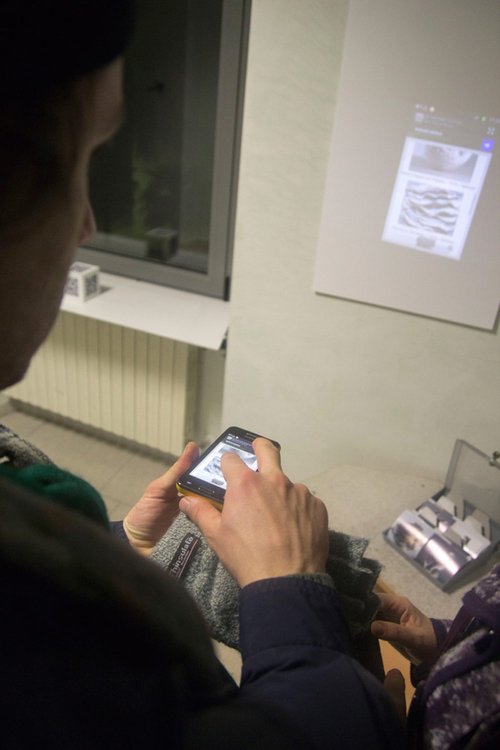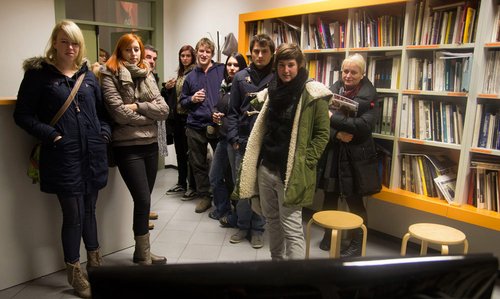Master's programme in Media Arts and Practices
| Study programme: | Master's programme in Media Arts and Practices |
|---|---|
| Main fields of study: | art |
| Programme code: | 2MUP |
| Programme cycle: | Second cycle master’s degree |
| Name of the qualification: | Master's degree |
| Qualification title: | magister akademski medijskih umetnosti in praks (equivalent to Master of Arts in Media Arts and Practices) |
| Qualification abbreviation: | mag. akad. med.um.pr. (equivalent to M.A. in Media Arts and Practices) |
| Final examination: | no |
| Dean: | prof. Boštjan Potokar |
| Programme director: | prof. Rene Rusjan |
| ECTS coordinator: | prof. dr. Iztok Arčon |
Programme description
The master programme of Media Arts and Practices (120 ECTS) offers the students to specialize in any of – or in between – the carrier module areas of:
- Animation
- Film
- Photography
- New Media
- Contemporary Art Practices
- Scenographic Spaces
Candidates are invited to approach the programme with a project idea or clear interest in a specific medium or creative realm. In an international study and production atmosphere students will, gradually develop their final project and theoretical thesis, all in close interaction with mentors, guest teachers and fellow students.
Regular peer reviews in front of academic committees and trans-disciplinary interaction in studio-workshops foster the student's increasing proficiency in the chosen area. Along the two years of study the student takes part in an individual selection of short skill- and theory-based courses, both on- and offline. Developed within the international (EU-supported) ADRIART (www.adriart.net) project, the programme offers academic experience in several site-specific course runs at referenced partnering institutions in Austria, Italy and Croatia
Programme structure and implementation
The Media Arts and Practices programme offers a selection of so called Carrier Modules, from which a student elects one on the basis of his/her master project proposal, interest or motivation: Animation, Film, Photography, New Media, Contemporary Art Practices, or Scenographic Spaces. These Carrier Module areas are not defined and implemented completely independently, rather they are supported and closely intertwined with other compulsory and elective modules, some of which are area-specific, but most are conceived to simultaneously support more than one Carrier Module:
Please consult the diagram for an overview of all modules and their interconnections
Each student’s individual master project represents the vertical vertebrae of his/her study programme. It is systematically developed, individually mentored and collectively reviewed within the compulsory Progress Track module which runs parallel with the Carrier Modules in the first three semesters, and where students regularly present and discuss with mentors and peers their personal (portfolio) as well as master thesis project progression.
Within the Studio Module the student is required to take one Studio per semester 1, 2 and 3 from a minimum of two choices offered per semester. A Studio course is a collective, congested study experience, closely connected to a student’s individual Carrier Module implementation. As a self-standing course it connects the areas of more Carrier Modules into a cohesive topic-based and research-oriented production. Often realised as a site-specific project in workshop form, it treats a specific topic in an interdisciplinary way.The offer, as well as profile (content) of Studios is "sensitive" to the realm choices of each year’s student cohort.
Please consult the diagram for an overview of all modules and their interconnections
Throughout the entire course of study students take a variety of smaller “courselets” that provide them withcompetencies required for their final master project. Taking into account the individual student’s entry skills and knowledge, the selections are partiallyruled by the student’s selection of the Carrier Module and negotiated with mentors within the Progress Track module. These courselets are organised within three supportive modules: Techniques in Practice (TIP), Discourses in Practice (DIP) and Selections in Practice (SIP) which are all compulsory, meaning that students have to earn ECTS from each (please consult the diagram). The Selections in Practice (SIP) module represents the so called “open part” of the curriculum, offering the students in the first year to freely choose any of the smaller units offered under TIP or DIP, perhaps attend an additional Studio course, or accredit any of the externally attained level- and area-relevant credits.
The Master Thesis compulsory module consists of two compulsory courses in the second year of study: Master Thesis Preparation (semester 3) reflects on the methodology of the master project production and leads to a full research-based concept for the written part of the master thesis; the Master Thesis course (semester 4) is ultimately where the student accomplishes the programme both in terms of theory (written paper, including project documentation) and practice (project/product), drawing also from the competences acquired in Carrier-Module based sequence of Studios and the selections within the supportive modules. Here the student finishes and evaluates the master project, produces the written part of the master thesis, and defends both in front of a committee.
Please consult the diagram for an overview of all modules and their interconnections
Along the entire programme of study, the student is closely connected with peers and mentors: The Carrier Module leader is usually the “expert mentor”, who guides the development of the student’s master thesis project and the overall in-depth acquisition of knowledge and skills within the chosen area. The expert mentors are also engaged within the Progress Track, where they are complemented by the “progress mentor”, guiding all enrolled students through group or individual meetings, through the Studio coursework and towards the Master Thesis. Every student also selects a personal tutor from the programme’s core teaching staff to accompany her/him throughout the study process.
Admission requirements
- Higher education degree (180 ECTS)
- Assessment of artistic ability for the Media Arts and Practices programme passed. Certificate of artistic ability is valid only for the current study year.
Applicants with a first degree from non-university higher education programmes accomplished after year 1993 and before 2005 according to the Higher Education Law of Slovenia are to address their application request to the School's Board of Studies. The Board can assign further conditions to the applicant according to her/his area of prior study, these can encompass BA-level provision, exam-only or non-formal qualifications.
Enrollment capacity: 8 (+1 for candidates who are not citizens of the EU)
In case the number of candidates exceeds the number of available enrollment places, the candidates will be selected based on their results: > Assessment of artistic ability: 90%, > Grade-point average of school degree: 10%.
Assessment of artistic ability includes:
- Pre-submitted portfolio of candidate's artistic or creative-industries realted works, with a full biography (should illustrate the candidate’s talent as well as the diversity and level of knowledge and skills in working with media technologies), and a motivation letter with project idea or expression of interest (should show activity of the candidate in and outside of the chosen medium/media as regards her/his choice of CARRIER MODULE, and briefly explain the candidate's master thesis project idea, or alternatively describe his/her motivations and interests in the choice of specific medium/media as related to own professional or academic pathway),
- Interview (In the interview the authorship of the submitted material shall be proven as well as the candidate’s ability of comprehension and expressing his/her thoughts in the realm of the study programme).
Educational and professional goals
By successfully finishing the programme, the student..
- acquires particular practice and theory-based skills and knowledge in the selected area (animation, film, contemporary art practices, new media, photography, or scenographic spaces) and their interconnections
- autonomously develops and manages own role and competences in a collective learning setting and in the individual master project, applying the developed roles and competences constructively and collaboratively within site-specific, topic-relevant production environments, nurturing a culture of continuous and strategic competency development.
- acquires and/or upgrades self-defined discursive skills and specific theoretical (history, criticism) and project-management related knowledge, along with practical skills related to field-specific methodology and technology, evaluating all of these against other components of competence in the field, and reflects on their interconnections
- carries out independent creative conception, realization (production) and finalization (including presentation) of a coherent project, based on research and/or development work in the selected area; the student completes this practical project, connected to a methodologically developed, theory-supported written thesis, both created according to international standards in the chosen area, presenting and defending them as a whole in public, in front of a professional/academic committee, peers and relevant programme-external stakeholders.
Access to further studies
After successfully finishing the programme, the student can either enrol a further postgraduate programme on MA or (also professional) PhD level, progress in the current professional pathway, or even pursue a new career in the selected area as mastered within the Media Arts and Practices programme.
Assessment
All modules finish with assessed coursework in the form of exercises, (semi)products, performed studies or seminar papers. There a very small share of informative final written examination, most of the assessment is formative. Often the assessed material coursework is accompanied by performed oral examination in the form of a viva infront of an academic and/or professional committee and peers. Incomplete progress between selected modules is possible. Most of the coursework is sumitted and archived digitally online, within a dedicated learning management system (intranet).
Courses refresh
1. year
| Compulsory courses | Hours | ECTS |
|---|---|---|
| Discourses in Practice 1 | - | 4 |
| Discourses in Practice 2 | - | 4 |
| Progress Track 1 | - | 4 |
| Progress Track 2 | - | 4 |
| Selections in Practice 1 | - | 4 |
| Selections in Practice 2 | - | 4 |
| Studio 1 | - | 4 |
| Studio 2 | - | 4 |
| Techniques in Practice 1 | - | 6 |
| Techniques in Practice 2 | - | 6 |
| General elective courses | Hours | ECTS |
| CM Animation 1 | - | 8 |
| CM Animation 2 | 240 | 8 |
| CM Contemporary Art Practices 1 | - | 8 |
| CM Contemporary Art Practices 2 | - | 8 |
| CM Film 1 | - | 8 |
| CM Film 2 | - | 8 |
| CM New Media 1 | - | 8 |
| CM New Media 2 | - | 8 |
| CM Photography 1 | - | 8 |
| CM Photography 2 | - | 8 |
2. year
| Compulsory courses | Hours | ECTS |
|---|---|---|
| Discourses in Practice 3 | - | 4 |
| Discourses in Practice 4 | - | 4 |
| Master Thesis | - | 22 |
| Preparation of Master Thesis | - | 6 |
| Progress Track 3 | - | 4 |
| Studio 3 | - | 4 |
| Techniques in Practice 3 | - | 4 |
| Techniques in Practice 4 | - | 4 |
| General elective courses | Hours | ECTS |
| CM Animation 3 | - | 8 |
| CM Contemporary Art Practices 3 | - | 8 |
| CM Film 3 | - | 8 |
| CM New Media 3 | - | 8 |
| CM Photography 3 | - | 8 |

